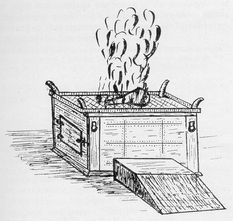weekly column
|
Each week, find a commentary on something connected to verses of Torah or another source of wisdom
|
|
Each week, find a commentary on something connected to verses of Torah or another source of wisdom
|
 The Exodus:5 Project Set the mesh below, under the ledge of the altar, so that it extends to the middle of the altar. Exodus 27:5 I hope that you recognize the premise of the joke that is contained in the title. If not, I will spoil it for you. A nudnik (look it up) in the synagogue keeps imploring the rabbi, “Make me a levi.” After many conversations about why that’s not possible and a large contribution that is persuasive, the rabbi declares that the nudnik is a levi. Asked why it was so important, the nudnik says, “It is a matter of family pride. See, my father was a levi, my grandfather was a levi, my great-grandfather…” A levi, or as he is gentiley known, a Levite, is descended from the tribe of Levi, designated by the Bible to serve the ritual needs of the other tribes of Israel. A single family from among Levi – descended from Aaron – are the priests. The Hebrew word for priest is kohen, but for whatever reason, the joke is funnier with “make me a levi” than with “make me a kohen.” Status as a levi or a kohen is mostly family tradition, though if your last name is Levi, Levy, Levine, Levin or Loewy or Cohen, Cowen, Kahn, Katz or Ginsberg (don’t ask), you just might be Levitical. I am of the opinion that there is a little levi in every man. I say that because of the magnetic attraction we all seem to have to backyard barbecue grills. Whether the disposable ones you pick up at Walmart, the classic Weber, the gas-fired KitchenAid Land Rover or the Big Green Egg, men like to poke at meat on the grill with a stick. (Vegetarians do not poke at meat but are still drawn to squash and artichokes over charcoal.) I do not know whether the ancient sacrifices provoked the fascination with a seared steak or if the Passover lamb roast just sort of caught on, but the smell of smoke seems to have evoked a sense of comfort among those who were concerned with being in the good graces of God. Even in traditions that have no legacy of sacrifices, it is not unusual to find incense used to enhance and enable peace of mind. You might call it mass aromatherapy. It is probably considered sacrilege by some that I would refer to the altar in the Tabernacle as a giant pit barbecue, but that is what it was. Hard to visualize from the very specific and very arcane instructions, the “mesh” in the verse above is really a grill, shaped to sit half-way down the structure and hold the sacrifice over the fire. Some pieces of the animal were burned up, but the meat was part of what sustained the priests after it was cooked. The burnt offerings fed not only the spiritual life of the Israelites, but also those who tended to spiritual needs. King Solomon famously observed that nothing was new under the sun, so I am relatively certain that the origins of roasted meat are not in the Biblical sacrifices or even among the early Hebrews. For reasons I cannot explain, even in the most patriarchal of societies, men seem to gravitate to outdoor cooking. It may be the urgings of ancient hunter-gatherer DNA or the residual memories of ancient temples, but transporting the receptacle, building the fire and grilling the meat still holds some sacred resonance for so many men. There is a lighthearted tone to this little bit of writing, I know. However, my message is serious. Primal inclinations, though transformed and even sanctified have survived to contemporary times. A stack of firewood, a pile of briquets, or the (decidedly inferior) flaming propane can still draw the spark of a levi out of the most modern of men. Contending with fire, making it serve our purposes from corn on the cob to burgers to marshmallows ignites some mystical impulse. The results are most satisfying, both s a meal and from the appreciation of those who partake in the feast. If the weather ever warms up in the spring of 2018, a less and less likely possibility, the grills will fire up again. Be it vegetables, fish, poultry or meat, men will walk out the back door and into the past to prepare a meal over the fire. When I take a minute to reflect on what I am doing, it will not necessarily make me a chef. But for a moment, it might make me a levi.
0 Comments
Leave a Reply. |
Archives
October 2023
Categories |